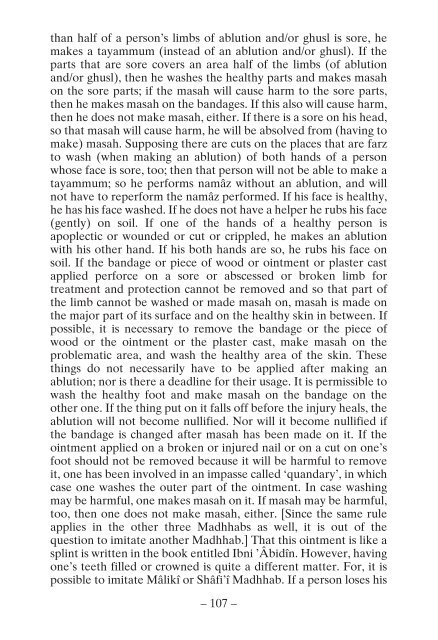Miftah-ul-Janna (Booklet for way to Paradise)
You also want an ePaper? Increase the reach of your titles
YUMPU automatically turns print PDFs into web optimized ePapers that Google loves.
than half of a person’s limbs of ablution and/or ghusl is sore, he<br />
makes a tayammum (instead of an ablution and/or ghusl). If the<br />
parts that are sore covers an area half of the limbs (of ablution<br />
and/or ghusl), then he washes the healthy parts and makes masah<br />
on the sore parts; if the masah will cause harm <strong>to</strong> the sore parts,<br />
then he makes masah on the bandages. If this also will cause harm,<br />
then he does not make masah, either. If there is a sore on his head,<br />
so that masah will cause harm, he will be absolved from (having <strong>to</strong><br />
make) masah. Supposing there are cuts on the places that are farz<br />
<strong>to</strong> wash (when making an ablution) of both hands of a person<br />
whose face is sore, <strong>to</strong>o; then that person will not be able <strong>to</strong> make a<br />
tayammum; so he per<strong>for</strong>ms namâz without an ablution, and will<br />
not have <strong>to</strong> reper<strong>for</strong>m the namâz per<strong>for</strong>med. If his face is healthy,<br />
he has his face washed. If he does not have a helper he rubs his face<br />
(gently) on soil. If one of the hands of a healthy person is<br />
apoplectic or wounded or cut or crippled, he makes an ablution<br />
with his other hand. If his both hands are so, he rubs his face on<br />
soil. If the bandage or piece of wood or ointment or plaster cast<br />
applied per<strong>for</strong>ce on a sore or abscessed or broken limb <strong>for</strong><br />
treatment and protection cannot be removed and so that part of<br />
the limb cannot be washed or made masah on, masah is made on<br />
the major part of its surface and on the healthy skin in between. If<br />
possible, it is necessary <strong>to</strong> remove the bandage or the piece of<br />
wood or the ointment or the plaster cast, make masah on the<br />
problematic area, and wash the healthy area of the skin. These<br />
things do not necessarily have <strong>to</strong> be applied after making an<br />
ablution; nor is there a deadline <strong>for</strong> their usage. It is permissible <strong>to</strong><br />
wash the healthy foot and make masah on the bandage on the<br />
other one. If the thing put on it falls off be<strong>for</strong>e the injury heals, the<br />
ablution will not become n<strong>ul</strong>lified. Nor will it become n<strong>ul</strong>lified if<br />
the bandage is changed after masah has been made on it. If the<br />
ointment applied on a broken or injured nail or on a cut on one’s<br />
foot sho<strong>ul</strong>d not be removed because it will be harmf<strong>ul</strong> <strong>to</strong> remove<br />
it, one has been involved in an impasse called ‘quandary’, in which<br />
case one washes the outer part of the ointment. In case washing<br />
may be harmf<strong>ul</strong>, one makes masah on it. If masah may be harmf<strong>ul</strong>,<br />
<strong>to</strong>o, then one does not make masah, either. [Since the same r<strong>ul</strong>e<br />
applies in the other three Madhhabs as well, it is out of the<br />
question <strong>to</strong> imitate another Madhhab.] That this ointment is like a<br />
splint is written in the book entitled Ibni ’Âbidîn. However, having<br />
one’s teeth filled or crowned is quite a different matter. For, it is<br />
possible <strong>to</strong> imitate Mâlikî or Shâfi’î Madhhab. If a person loses his<br />
– 107 –

















